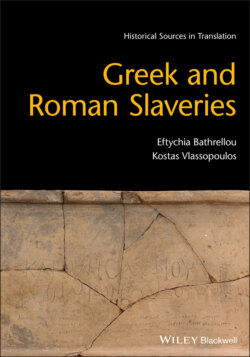Читать книгу Greek and Roman Slaveries - Eftychia Bathrellou - Страница 39
1.28 Herodotus, 4.1–4.4: Greek Historiography (Fifth Century BCE)
ОглавлениеThe fourth book of Herodotus is devoted to the Scythians, a major power in the north coast of the Black Sea. After reporting a Scythian expedition against the Medes in the Near East, Herodotus narrates the consequences of the long absence of the Scythians from home.
Literature: Harvey 1988; Hunt 1998: 42–52.
After 28 years away from their own land and upon their return home after such a long time, the Scythians were met by a task no less laborious than their war against the Medes, for they found a substantial army opposing them. To be more specific: the wives of the Scythians, as their husbands had been away from them for a long time, were having relations with the slaves. […] From these slaves and the Scythian wives, a generation of youths was reared, who, when they learnt of their origins, were opposed to the Scythians returning from the land of the Medes. First, they dug a wide trench, stretching from the Taurian mountains to lake Maiotis, at the point where it is broadest, and thus cut off the land. Then, when the Scythians attempted to invade, they camped opposite them and started fighting them. As they met in battle many times and the Scythians could not manage to gain the upper hand in this manner, one Scythian said the following: “What are we doing, Scythians? We are fighting against our own slaves, so we get killed and thus become fewer, and we kill them and will thus rule over fewer men in the future. Therefore, I think that we should now leave aside spears and bows, and each one should take his horse whip and draw near them. Until now, they have seen us bearing arms and thought of themselves as the same as us and of the same origin. But when they see us bearing whips rather than arms, they will learn that they are our slaves. When they realize this, they will not stand their ground.” The Scythians heard this and proceeded to do it. The others, shocked at what was going on, forgot the battle and started to flee. This then is how the Scythians ruled over Asia and, when driven out again by the Medes, it was by such means that they returned to their own land.
How did the Scythians overcome the resistance of the sons of their slaves?
Did the children of the Scythian women and the Scythian slaves grow up as slaves?
If not, why did the stratagem of the Scythians work on these young men, according to the passage? What does this imply about how masters thought of slaves?
What conception of slavery is evident in this passage? Cf. 1.1.
